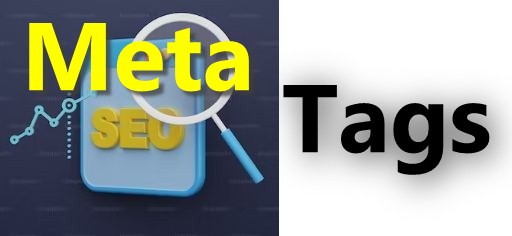Meta Tags For On Page SEO
Meta tags are HTML elements that provide information about a webpage to search engines and website visitors. They are invisible to website users but play a crucial role in optimizing a webpage for search engines and social media platforms.

Meta tags typically include the following:
- Title Tag (Meta Title): This tag specifies the title of a webpage and is displayed in search engine results as the clickable link to the page. It should be concise, descriptive, and contain relevant keywords to attract users.
- Meta Description Tag (Meta Description): This tag provides a brief summary of the webpage’s content. It appears below the title in search results and serves as a snippet to entice users to click on the link. A well-crafted meta description should be compelling and include relevant keywords.
- Meta Keywords Tag (Deprecated): In the past, this tag allowed webmasters to list keywords relevant to the webpage’s content. However, search engines no longer consider this tag for ranking purposes due to abuse by spammers.
- Meta Robots Tag: This tag instructs search engine bots on how to crawl and index the webpage. Common directives include “index” (allowing indexing) and “noindex” (preventing indexing), as well as “follow” (follow links) and “nofollow” (do not follow links).
- Meta Viewport Tag: Primarily used for responsive web design, this tag sets the viewport’s width and initial scale, ensuring that web content is displayed correctly on various devices, especially mobile screens.
- Meta Charset Tag: This tag specifies the character encoding used on the webpage, ensuring that special characters and symbols display correctly.
- Meta Author Tag: Optionally, this tag identifies the author of the webpage’s content. It can be useful for content attribution but is not commonly used.
- Other Custom Meta Tags: Webmasters can create custom meta tags to provide additional information about the webpage, such as geographic location (geo meta tags), content type (content-type meta tags), or social media-specific tags (Open Graph and Twitter Card meta tags).
- Canonical Tag (rel=”canonical”): While not always considered a meta tag, this HTML element specifies the canonical (preferred) version of a webpage when multiple versions with similar content exist. It helps prevent duplicate content issues.
Meta tags are an essential part of on-page SEO (Search Engine Optimization). They help search engines understand the content and context of a webpage, making it more likely to appear in relevant search results. Additionally, meta tags can influence the click-through rate from search results and the appearance of shared links on social media platforms when shared by users.
Here are explanations of each type of meta tag with example HTML code:
- Title Tag (Meta Title):
- Description: Specifies the title of the webpage displayed in search engine results.
- Example Code:
<title>Your Page Title Here</title>
- Meta Description Tag (Meta Description):
- Description: Provides a brief summary of the webpage’s content in search results.
- Example Code:
<meta name="description" content="A brief description of your webpage content." />
- Meta Robots Tag:
- Description: Instructs search engine bots on how to crawl and index the webpage.
- Example Code:
<meta name="robots" content="index, follow" />
- Meta Viewport Tag:
- Description: Sets the viewport’s width and initial scale for responsive design.
- Example Code:
<meta name="viewport" content="width=device-width, initial-scale=1.0" />
- Meta Charset Tag:
- Description: Specifies the character encoding for the webpage.
- Example Code:
<meta charset="UTF-8" />
- Meta Author Tag (Optional):
- Description: Identifies the author of the webpage.
- Example Code:
<meta name="author" content="John Doe" />
- Other Custom Meta Tags (Open Graph and Twitter Card):
- Description: Provide additional information for social media sharing.
- Example Code (Open Graph):
<meta property="og:title" content="Your Page Title Here" />
<meta property="og:description" content="A brief description of your webpage content." />
<meta property="og:image" content="http://example.com/your-image.jpg" />
- Example Code (Twitter Card):
<meta name="twitter:card" content="summary" />
<meta name="twitter:title" content="Your Page Title Here" />
<meta name="twitter:description" content="A brief description of your webpage content." />
<meta name="twitter:image" content="http://example.com/your-image.jpg" />
- Canonical Tag (rel=”canonical”):
- Description: Specifies the canonical (preferred) version of a webpage to prevent duplicate content issues.
- Example Code:
<link rel="canonical" href="http://example.com/preferred-url" />
These HTML meta tags are essential for optimizing your webpage for search engines, improving click-through rates in search results, and controlling how your content appears when shared on social media platforms. Be sure to customize the content and attributes of these tags to suit your webpage’s specific needs and content.
![]()